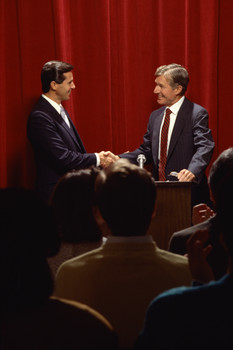

|
Tips for the New Hampshire primary - Political Professional New Hampshire Democrats were hurting after the 2002 elections They lost competitive races for the U.S. Senate and House, as well as the governorship. As the field and get-out-the-vote (GOTV) directors for the Democratic gubernatorial candidate, Mark Fernald, wt really felt that pain.
The campaigns of the 2004 Democratic presidential campaigns first must understand the importance of independent voters who live in Hillsborough and Rockingham counties, which have become bedroom communities for the Boston metro area. Voters there are not likely to be won over without the use of Boston TV. Indeed, in southeastern New Hampshire, Boston TV is a must in order to win over the independent voters, who in turn are key to winning the state. The relevance of these voters is a residue of the strong national economy in the latter half of the 1990s, when an especially strong economy in New Hampshire brought new voters into the state. During the last decade, income per capita in the Granite State grew 33.9 percent. Between 1994 and 1999: 207,862 new people migrated into the state according to the U.S. Bureau of the Census's estimates branch; about 75,000 came from Massachusetts, and most settled in Hillsborough and Rockingham counties, just over the state line. These numbers become most relevant to elections when viewed as part of the 2002 turnout. The same two counties represented 52 percent of the vote in the governor's race The voters in these two counties can be further subdivided into what was affectionately called "the black hole" by field stall from various statewide races. These towns have seen the most new voters, and there was an unknown quality about who they were what motivated their vote and how best to reach them. The black hole includes 22 towns in the eastern part of Hillsborough County and the western part of Rockingham County. The area is important because the total vote in these 22 towns comprised 47 percent of the vote total in two counties. That same area also comprised 24 percent of the vote total in the entire state. Predicting partisan voting patterns in the area has become difficult. For instance, the area's 2002 Democratic performance Jude' (DPI), which measures Democratic voter turnout, was largely irrelevant, because of all the new voters. Here are a few general perceptions about these voters: * At least one person in the household works in Massachusetts. * At least one person in the household has resided in New Hampshire for less then five years. * While these voters have access to the New Hampshire media market, they are much more likely to participate in the Boston media market. It is clear that any candidate running statewide needs to reach the voters in the black hole. The question is how. The traditional New Hampshire process of non-televised public debates, an important way to reach voters for more then a century; was ongoing in 2002 gubernatorial election, but it played a less significant role. In the general election, the gubernatorial candidates were invited to attend 19 debates. Of those, Fernald went to 13, and the Republican candidate, Craig Benson, attended six. Benson skipped all of the events inside the black hole. Given his decision to avoid the public thrums, we concluded that he relied heavily on Boston television to attract voters in the black hole. Benson ads hit the airwaves on Boston stations in January and continued to do so in large quantities through Election Day. In contrast, Fernald did not go on air until late October, when he purchased all of his TV time on WMUR in Manchester. It is almost impossible to win a statewide election in New Hampshire without winning the black hole. In the primary, Democratic campaigns will have to worry about winning over both registered Democratic voters and independent voters. If relocation rates continue at the current pace and with Election Day registration still in effect, any DPI figures will be irrelevant again in 2004. Field staff will again be left wondering how to do their targeting in the black hole. The battle will be for independent voters, particularly in the southeast part of the state With the independent vote, an underdog candidate could pull a John McCain and sweep Election Day from the front runner. Campaigns can expect a higher refusal rate on phones than the5 got in 2002 because there will be more statewide candidates competing for the same pool. This will three the emphasis to be on media, and ratings indicate that voters in the commuter towns are reached best through Boston TV. To win the 2004 Democratic presidential primary, candidates will have to understand the importance of the black hole and to a larger extent, Hillsborough and Rockingham counties. They must understand that TV will play a crucial role in winning over these voters. David Nassar is a public affairs consultant in Concord, N. H. David Slack is vice president of the Highland Strategy Group, a field strategy and consulting firm based in Columbus, Ohio. |
Unauthorized duplication in part or whole strictly prohibited by international copyright law.
 Like many Democrats around the countries, we repeatedly were asked why this happened. Finding the answers is particularly important now for Democrats, since New Hampshire holds the first state presidential primary.
Like many Democrats around the countries, we repeatedly were asked why this happened. Finding the answers is particularly important now for Democrats, since New Hampshire holds the first state presidential primary.